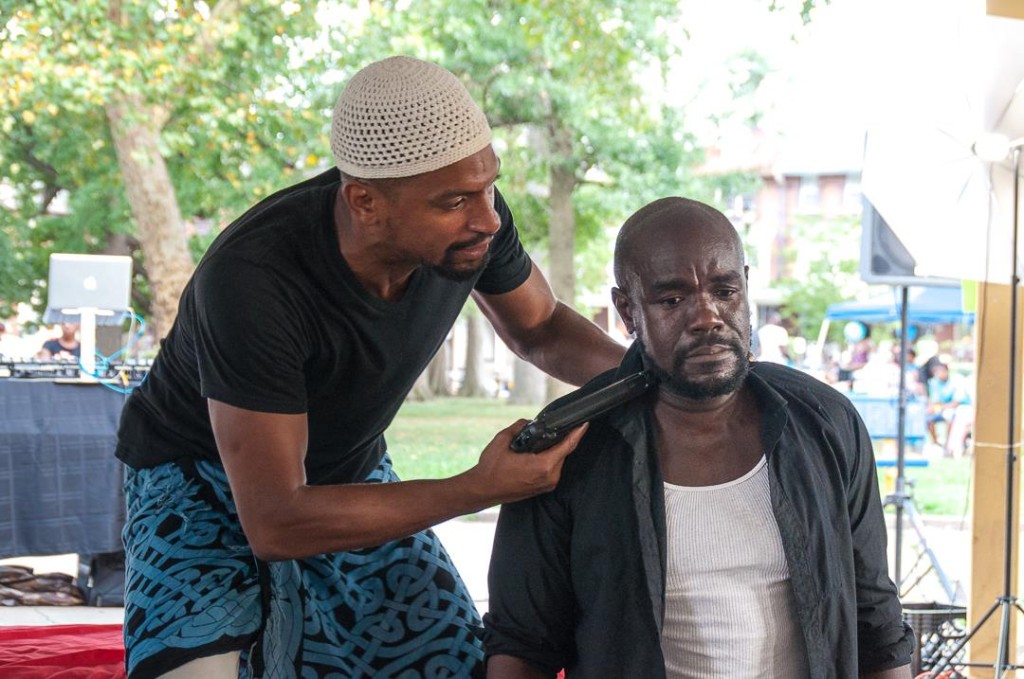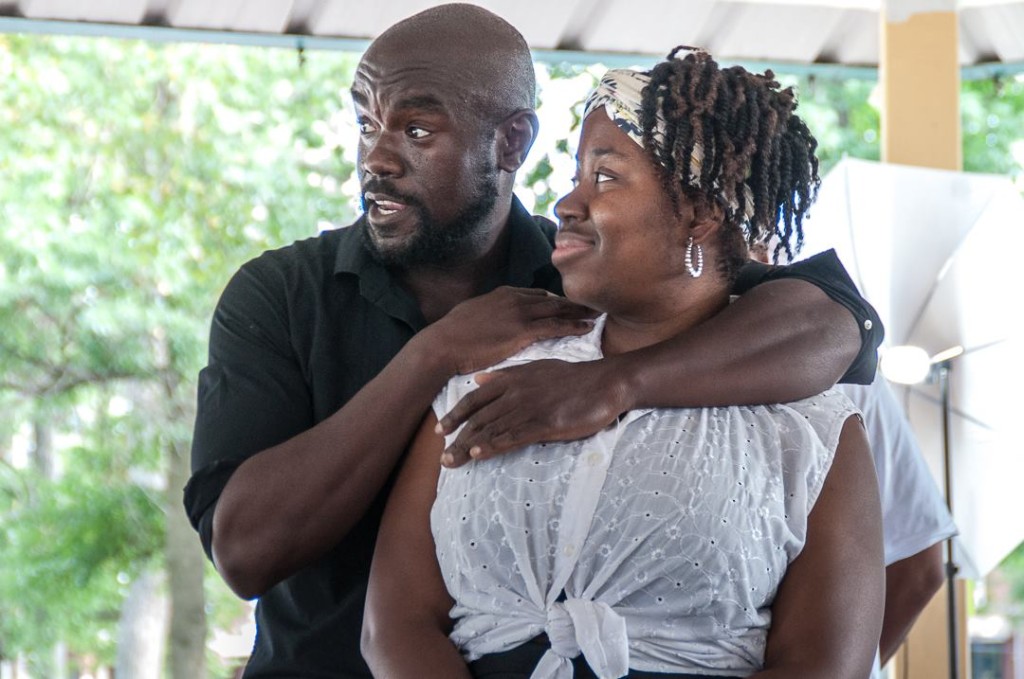Last year, Ozzie Jones directed Philadelphia’s first all-black production of Arthur Miller’s Death of a Salesman to positive responses. Jones had already made a name for himself with non-traditional casting of classic plays. In 1997, Jones directed OTHELLO in Dublin, Ireland, with a white actor playing the Moore in blackface, and a black actor playing his evil counterpart Iago. Numerous companies have recast OTHELLO in a similar manner, but this year Jones has gone a step further with an ALL-black casting of Shakespeare’s tragedy.
In this, the second of a two-part interview [read part one here], Jones talks to Phindie writer Henrik Eger about his casting choices. [Malcolm X Park, 52nd and Pine streets] August 8-22, 2015; theatreinthex.com.

An all-black OTHELLO
Henrik Eger: How did you come up with the idea of casting a black OTHELLO, instead of having a white Othello in an all-black environment?
Ozzie Jones: The idea came from Carlo Campbell. I wanted the audience in the Malcolm X Park neighborhood to relate to this play. I see Othello as an honest man and lonely warrior who looks different from the rest of the Venetians. He is unlike the others because of his rank as a general. He is also vulnerable because he is not part of the gangs that are roaming the streets. Therefore, he becomes an easy target for those around him.
I wanted to make OTHELLO become part of the area around 52nd and Market where, in the late 1950s, the Black Mafia, a dangerous crime organization, was born. In those days, there were not many Muslims in Philadelphia, so our Othello stands out along with Desdemona, who converted to Islam.
History has shown that jealousy and envy often lead to bloodshed, as it happens in the criminal underworld all the time. I was convinced that the audience in the Malcolm X Park neighborhood would relate to these problems.
Eger: How do the ideas in the play change without race as the issue.
Jones: Well, the change is actually quite simple. When you take the backdrop of racism and white supremacy out of the casting, OTHELLO becomes a play about jealousy. The realities of how human beings deal with jealousy, rage, love, etc. are what we must discuss and investigate. It was actually quite liberating. Through rehearsal, we did not have to discuss how white people feel about black folks. Gloriously liberating.
Eger: Powerful stuff. But doesn’t Shakespeare’s choice of words present quite a challenge for your liberating interpretation?
Jones: Shakespeare’s language—presenting Othello’s race and color in a disparaging, hateful way—reflects what the characters in the play think about Othello’s integrity and intellect. Our production of this tragedy showed the sadness, pain, and death that can come from human frailty, envy, passion, and violence—without the tiresome, destructive stupidity of white supremacy. I found it quite moving that our all-black OTHELLO didn’t fall apart as a play. I actually think it took wings and flew.
Eger: You present Othello as a Muslim living in a violent non-Muslim environment.
Jones: I didn’t want to make Othello different because of race, so I envisioned him as a Muslim in a non-Muslim environment. In the black community in the 1950s, most folks were Christian, and many of them were scared of Malcolm X. But now, over half a century later, many black Muslims live in that area.
Considering what’s going on in the US, making Othello a Muslim man would make it reasonable that he would feel the level of paranoia that he felt, sitting in the back of his mind, fearful that everyone is against him. And Iago is massaging that insecurity, that fear.
Eger: Did you encounter any resistance to your all-black OTHELLO? If not, could such an absence suggest that at least the theater world is open to innovative approaches—and is not based on racial criteria?
Jones: To quote Thelonious Monk [American jazz pianist and composer with an “unorthodox approach to the piano”]—“I listen to my own music.” My focus is on the people I work with, the work that we are making, and the community we are making it for. If there were any resistance, I would not have heard it.

Casting an all-black OTHELLO
Eger: Tell us about your actors, especially those playing Othello, Desdemona, Iago, Emilia, and Cassio.
Jones: The actors are bloody fabulous. This is my first time directing Dwayne A. Thomas who is playing Iago. He gives a truly wonderful performance. I cast Carlo Campbell as Othello, because he was born to play that role, and Nastassja Baset as Desdemona, Walter DeShields as Cassio, and LaNeshe Miller-White as Emilia—all actors who are unique and have passion to do Shakespeare.
Eger: From your OTHELLO cast, Carlo Campbell is one of the few actors who gets hired quite often by a number of different companies, but I don’t think I have seen everyone else appear on Philadelphia stages regularly.
Jones: True. Not only are these actors interesting to watch, they have a really high technical ability as well. The number of gifted, well-trained black actors who never get to perform on downtown theater stages is disgraceful. I want lots of people to come and see this production, so they can witness how incredibly good these actors are.
Hopefully, the public can start demanding to see them on stages everywhere.
Beyond OTHELLO
Eger: You are well known for ground-breaking productions. What would be some of your dream projects as a director?
Jones: I have been working on creating a large series of plays called The Real Book. The idea of my collection is to write a number of plays that are inspired by America’s most important jazz composers and compositions. The Real Book series will be broken up into five parts: Blues, Swing, Bop, Modern, and Queens (women composers). Each section will have four plays.
Eger: Where are you now with your work?
Jones: I have almost finished the Bop section. The first piece in my Real Book is Chasin’ the Bird. In short, it is my imagining of the dream Charlie Parker had as he lay dying. Chasin’ the Bird was developed and read at Penumbra Theater in Saint Paul-Minneapolis, in 2012.
Kind of Blue is the second work in The Real Book series. Its first public reading was for African Continuum Theater at Arena Stage in Washington, D.C., in 2013. And recently, I fully mounted it at Freedom Theater. Kind of Blue is a romantic poem about love and relationships, birthed from the music of Miles Davis’ Kind of Blue.
The other two remaining pieces are Liver and Onions, inspired by the music of Thelonious Monk, and A Love Supreme, an epic poem inspired by John Coltrane’s A Love Supreme.
The goal of each piece in The Real Book will be to write plays that feel, move, and swing like the sound of the artists’ music—and not bore anyone with a linear, biographical retelling of an artist’s life. A large, long-term goal is to finish and have them performed everywhere.
But you know how it goes—one step at a time.

Thank you for featuring in your JAZZ publication this interview with OTHELLO director Ozzie Jones who happens to be such a great lover of Jazz that he is working on five new plays that center on various aspects of Jazz. Check PHINDIE for more articles in the future.
You might also be interested in “Rhythm, race, and energy: Interview with Ozzie Jones on the first African American production of DEATH OF A SALESMAN in Philadelphia.”
https://phindie.com/rhythm-race-and-energy-interview-with-ozzie-jones-on-the-first-african-american-production-of-death-of-a-salesman-in-philadelphia/
Henrik Eger, Ph.D.
Editor, http://www.DramaAroundTheGlobe.com